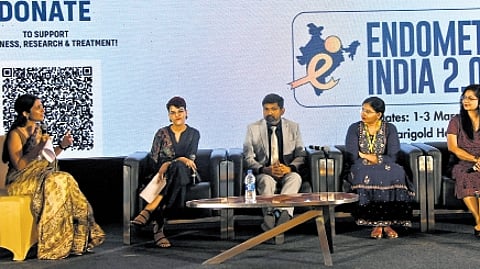

HYDERABAD: For a disease that is as common as diabetes, affecting over 247 million women worldwide and 42 million in India, it takes about eight years for those suffering to receive treatment: a startling revelation that came to light at a public awareness event organised by the Endometriosis Foundation of India (EFI), recently.
Endometriosis is a condition where, “tissues similar to that of endometrial cells grow aberrantly and outside of the uterus. These lesions are estrogen-dependent, benign, inflammatory, stem-cell-driven, and at times progressive,” said Dr Vimee Bindra, founder of EFI. She explained that the condition impacts the whole body of the patients.
“It is a chronic condition associated with severe and life-impacting pain during periods, sexual intercourse, bowel movements, and/or urination, chronic pelvic pain, abdominal bloating, nausea, fatigue, as well as depression, anxiety, and infertility. Aside from these effects, the condition has a far-reaching influence on multiple organ systems of the body. Many complications such as cardiovascular disease and ovarian, breast, cervical, and endometrial cancer, alongside autoimmune disorders, and more are related to endometriosis,” she added.
The awareness programme included panel discussions and advocacy for a greater empathetic reception of patient experiences. It ended with a dance performance showcasing a patient’s experience of being unable to dance due to the disease.
The panel titled ‘Empowering Perspective: Bridging Knowledge And Action On Endometriosis’ included A Sridevasena, Commissioner of School Education, Telangana; Dr Ponnuru Malathi, Professor and Superintendent, MGMH, Osmania Medical College; Swarnima Bhattacharya, co-founder, Gytree; Uma Sudhir, Executive Editor, NDTV and was moderated by Dr Vimee Bindra, who is also an Endometriosis Excision Surgeon.
Talking about their own experiences of being in different areas of work and grappling with chronic period pain, management issues and insensitive home and workspaces; women in the panel urged for greater recognition of the issues through changes in school and college curriculi, awareness and sensitisation of employees in workspaces.
“The government of Telangana aims to collaborate with the EFI to create more awareness about this public health disorder,” said A Sridevasena. “Telangana has over 26,000 government schools. We need to sensitise teachers, parents and students on this subject. We plan to find ways to involve all stakeholders in disseminating information and creating awareness. To make it part of the curriculum is also being considered,” she added.
Adding to her suggestions, Dr Malathi said that endometriosis is treated as a non-core topic in medical colleges, which renders the medical students unversed about the issues faced by women. “It is one of the most untreated, misdiagnosed conditions and the reason is that priority is not given to this subject in medical curriculum. It is only dealt with in theoretical terms. We need to have real case scenarios in medical colleges to create more knowledge about endometriosis,” she added.
The next panel, which focused on patient advocacy, invited Garima Mahajan, Operations Manager, Natfirst; Dr Swetha Dandamundi, General Physician; Dr Shilpa Rao, Dentist; Dr Vijay B Bandikatla, Pain Specialist and Dr Madhuri Vagile, Pelvic Floor Rehab Practitioner, to discuss how to navigate the challenges of endometriosis after the excision surgery.
Before introducing the panel, the moderator Medha Kohli, Project Manager-Girl Effect emphasised that endometriosis results in many broken marriages, depression, stagnation in professional work and broken families. Hence, believing their experiences and knowledge about their bodies is the first and foremost step in the treatment of the condition.
The evening concluded with a classical dance performance by endometriosis patient Nikitha. She depicted her struggle of fighting the disease and how it affected her life, including her passion for dancing. Taking to the stage just six months after the surgery, she showcased how she overcame through perseverance and resilience.